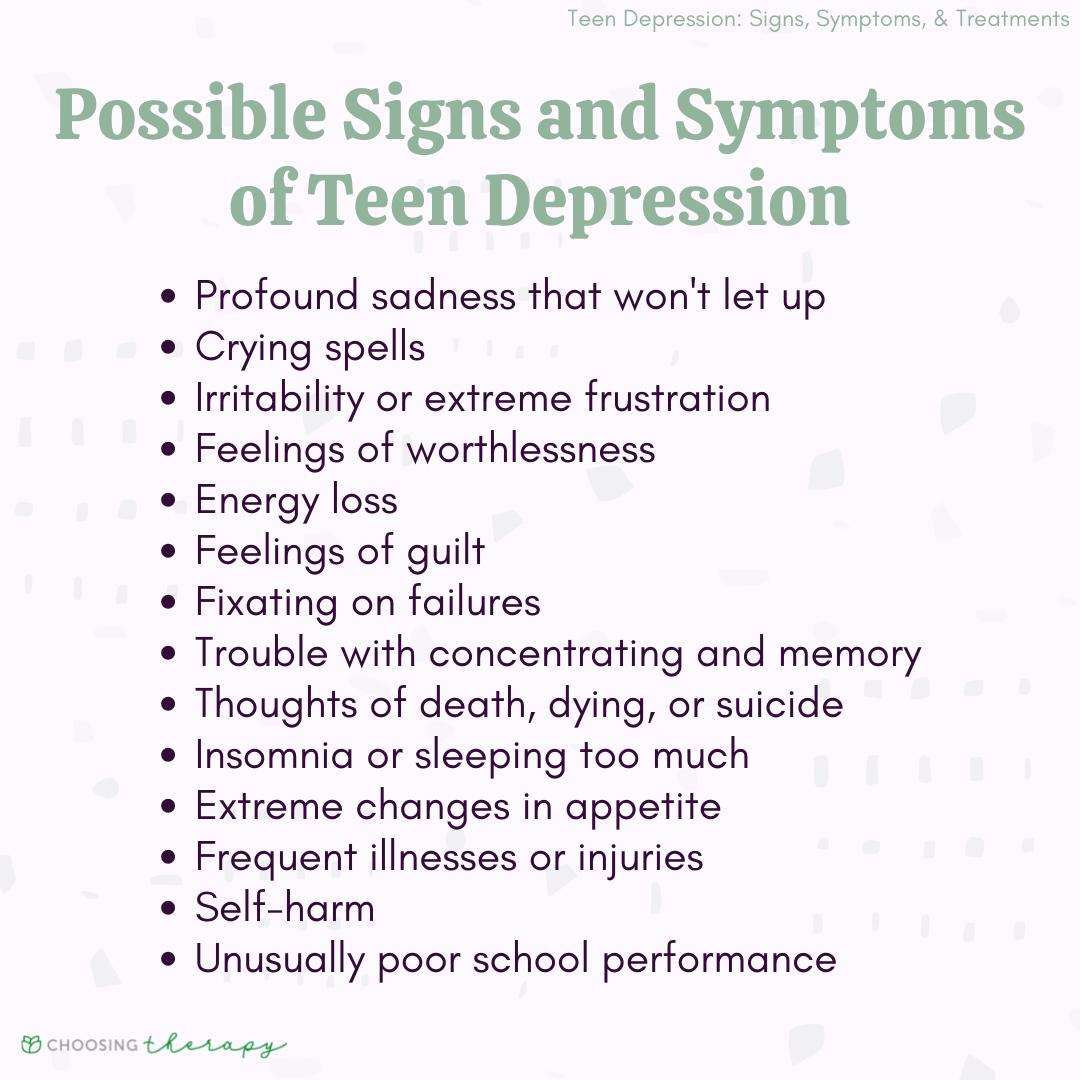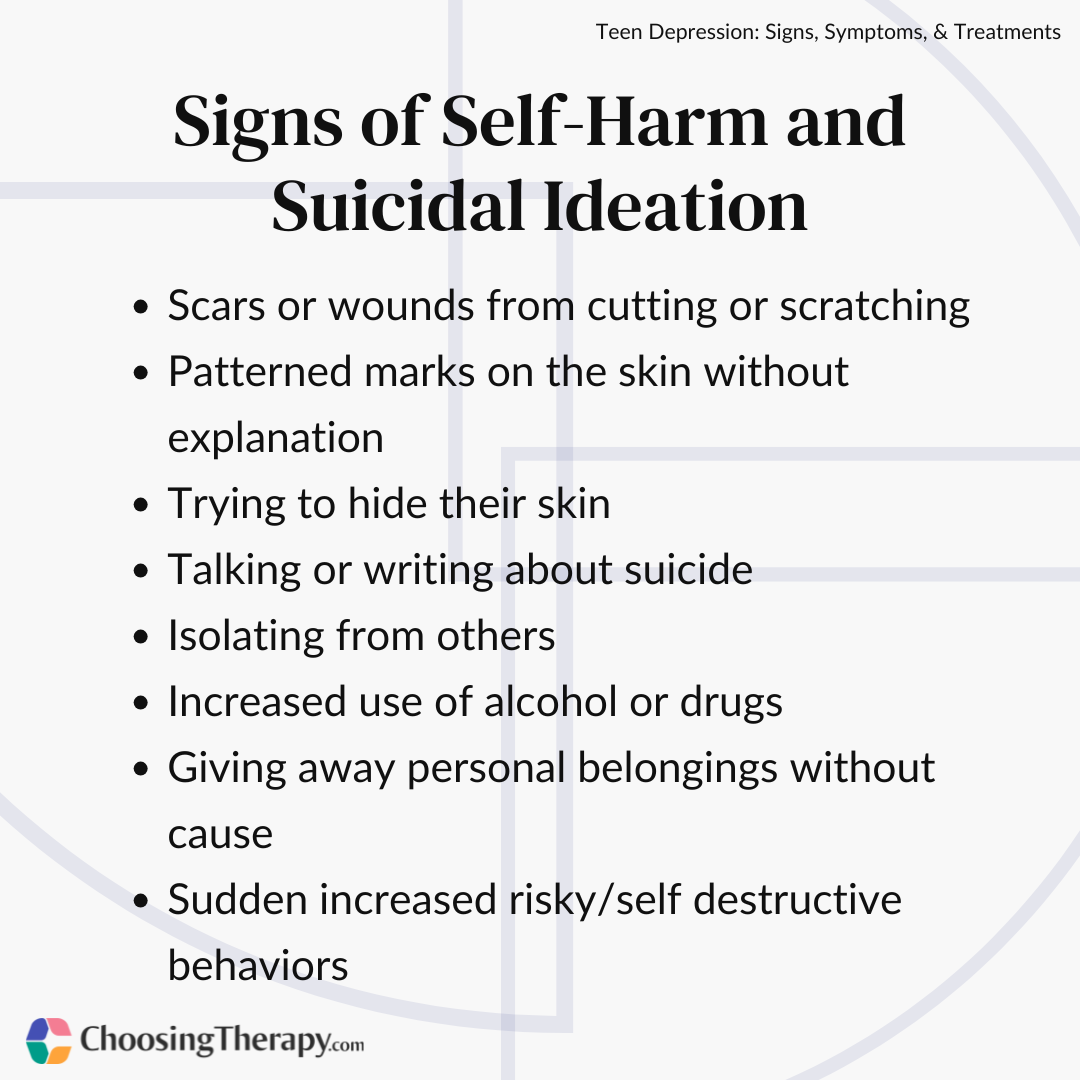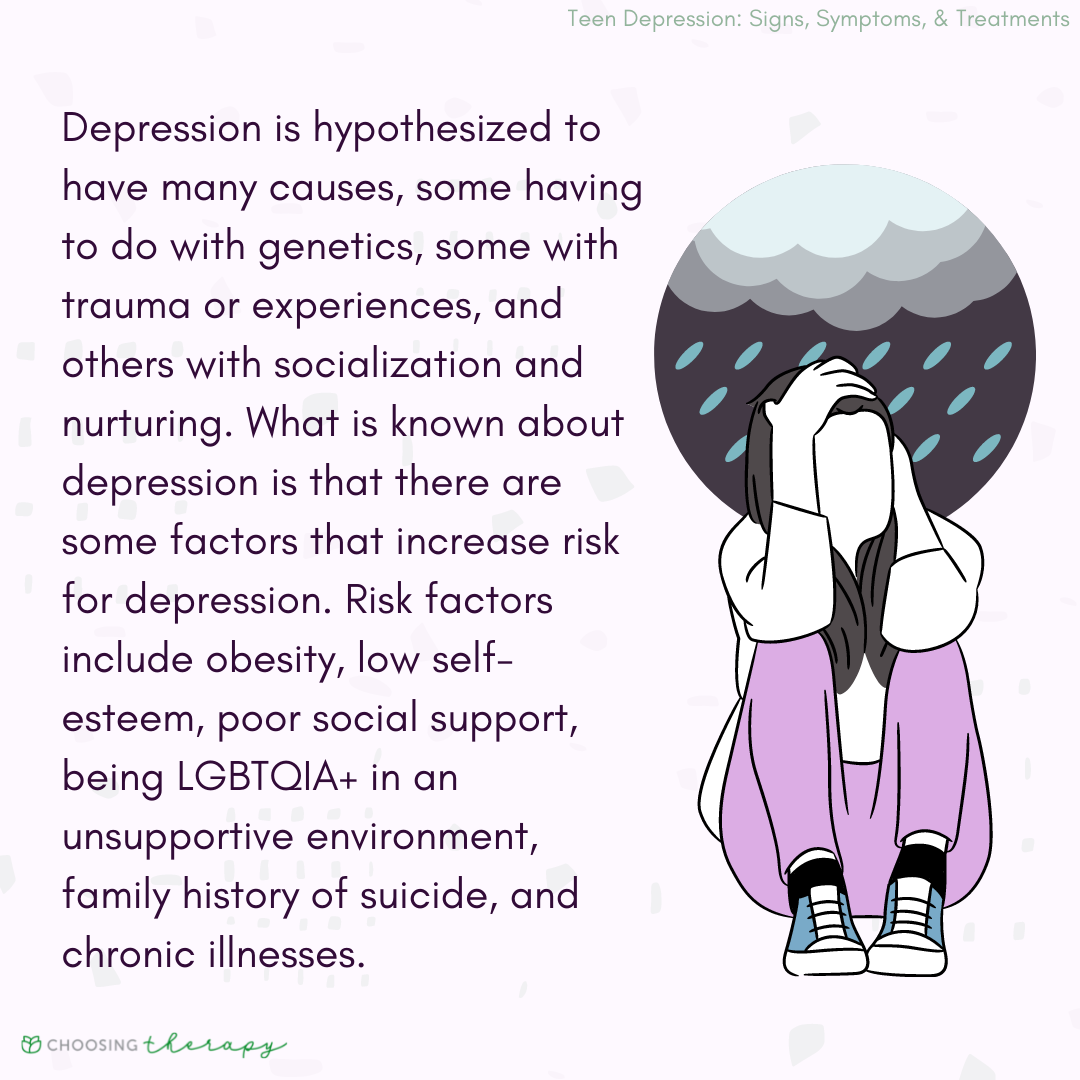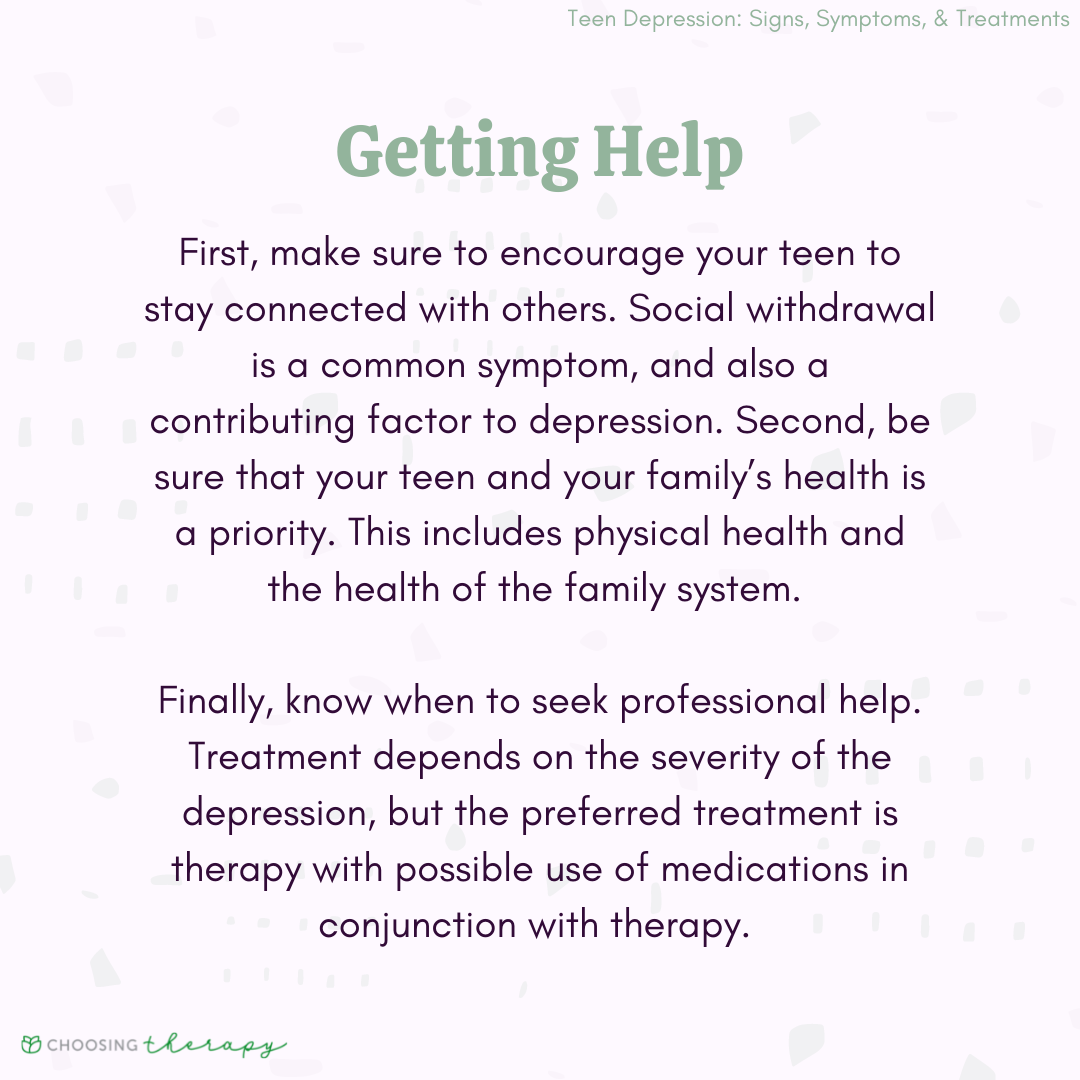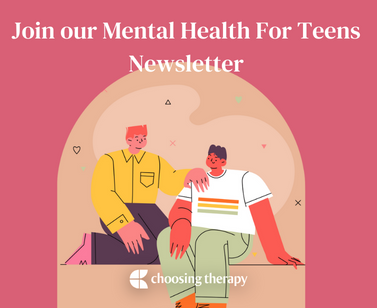Depression in teens can look similar to depression in adults. However, depression in teens also manifests specific symptoms such as extreme irritability, low self-esteem, fixation on failures, frequent visits to the school nurse, frequent illnesses, increased risky or impulsive behavior, and extreme sensitivity to rejection or failure.1 Teen depression is treatable with therapy and, for some, medication.
What Is Depression?
Depression, a mood disorder, leads to depression symptoms that impact emotional, mental, and physical functioning. Often these symptoms present feelings of melancholy or despair that persist, accompanied by loss of energy.2
What Is Teen Depression?
In teenagers, depression goes beyond the teenage angst or moodiness that comes in the teen years of development. Unlike teen angst, depression is a potentially life-threatening condition that deeply impacts functioning and social development.
Charlie Health - Therapy Once Per Week Isn’t Always Enough Charlie Health’s virtual mental health program includes curated peer groups, individual therapy, and family therapy for teens and young adults with serious mental health issues. Insurance accepted. Learn More
Signs of Depression In Teens
While the teen years typically are marked by teen angst, or general feelings of insecurity and apprehension, depression goes far beyond this. Depression is a serious mental condition that can be potentially life-threatening (i.e., teen suicide), and has lasting impacts if left untreated. There are several signs of depression to look out for in teens.
The signs of depression in teens may include:1
- Profound sadness that lasts
- Uncontrollable crying, sometimes for no explained reason
- Irritability or extreme frustration
- Feelings of worthlessness
- Feelings of guilt
- Fixating on failures or exaggerating their shortcomings
- Trouble thinking or concentrating, and memory problems
- Thoughts of death, dying, or suicidal ideation
- Insomnia, sleeping too much, or feeling too depressed to get out of bed
- Extreme changes in appetite (depression & weight gain)
- Frequent illnesses or injuries
- Self-harm
- Unusually poor school performance or frequent absences
Signs of Depression In Teenage Boys
Depression in male adolescents can look different vs. their female counterparts. Teenage boys tend toward anhedonia, or the loss of pleasure in life. They may experience increased irritability, restlessness, self-hatred, and sadness. They may also exhibit behavioral symptoms like physically lashing out or outbursts of anger, and increased fatigue.4
Overall, symptoms of depression in teenage boys tend toward outward expression, but not in every case. Anger, annoyance, changes in sleep and behavior are indicators of a problem. When depression persists, it can lead to more crippling depression, including severe symptoms such as self-hatred, self-harm, and suicide.
Signs of Depression In Teenage Girls
Depression in teen girls manifests with distinct symptoms vs. depression in their male counterparts. Feelings of guilt and difficulty concentrating are primary indicators of depression in female teens. Along with this, there can be loss of appetite, dissatisfaction with body image, changes in sleep patterns, and general sadness and loss of interest.4
Female teens tend to exhibit more cognitive symptoms, resulting in more subtle behaviors at times, but the outward expression of these inward feelings can be quite noticeable. One study suggests that perceived lack of social support is a risk factor for women, alluding to the social impact that depression can have.3 Self-harming behavior is also common among female teens with depression.
Depression Symptoms In Teens
Symptoms of depression in teens are similar to those in adults. However, the behavioral symptoms can vary, likely due to the developmental stage at which these symptoms are occurring and the biological factors at play that already impact behavior in typical teens.
The symptoms of depression in teens may include:1,2
- Sadness
- Loss of interest or pleasure in activities you used to enjoy
- Change in weight
- Difficulty sleeping or oversleeping
- Energy loss
- Feelings of worthlessness
- Thoughts of death or suicide
- Increased anger, irritability, or restlessness
- Increased risk taking, lack of regard for safety of self
- Feelings of guilt
- Difficulty concentrating
What’s Normal vs. What’s a Problem?
This time in your teen’s life involves a lot of change. It is normal for them to experience common teen issues like changes in friends, interests and hobbies, and possibly even their sexuality. It’s also normal for your teens to experience changes in their academic performance and/or enthusiasm for school. Allow space for them to explore themselves and ride out some of these changes while continuing to monitor their overall well-being.
It can be difficult to determine typical levels of moodiness or angst versus an actual mental health condition. Schedule a visit with your child’s doctor if you notice mood or behavior changes have become prolonged, extreme, debilitating, or impact their daily functioning.
Popular Options For Teen Mental Health
Talkspace – Online Therapy For Teens. A space for your teen to talk about what’s going on, develop coping skills, and start feeling better. Covered by most major insurance plans. Get Started
Charlie Health – Therapy Once Per Week Isn’t Always Enough. Charlie Health’s virtual mental health program includes curated peer groups, individual therapy, and family therapy for teens and young adults with serious mental health issues. Insurance accepted. Learn More
Equip – Eating Disorder Treatment That Works – Delivered At Home. Are you worried that your child has an eating disorder? With the right treatment, lasting recovery is 100% possible. Equip offers virtual evidence-based care, so you can help your loved one recover at home. We take insurance! Get a Consultation
Depression In Teens Vs. Adults
While the overall signs and symptoms of depression remain relatively the same when comparing teens vs. adults, there are key differences. Depression in teens is often expressed through anger and irritability, which can easily be overlooked as teenage angst, while adults suffering from depression are observed as being more sad and withdrawn.
In a study comparing the symptoms in adolescent and adult depression, it was observed that adolescents were more likely to experience physical disturbances due to their depression, like loss of energy, changes in weight, appetite and sleep patterns. Loss of interest, referred to as anhedonia, and difficulty concentrating were more commonly reported in adults.16
Suicide & Self-Harm Warnings In Teens
Depression is strongly linked to suicide and also increases the risk of developing self-harm behaviors. Teens with depression are 12 times more likely to attempt suicide vs. the general population.5 One study found that one in six teens have engaged in some form of self-harm behavior.6
Signs a teenager may be committing self-harm include:7
- Scars or wounds from cutting or scratching
- Patterned marks on the skin without explanation
- A preoccupation with self-harm or peers who self-harm
- Trying to hide their skin
- Increased recklessness
- Participating in riskier activities, or seeking situations that could result in injury
- Not caring for injuries, reinjuring themselves, or worsening injuries
A very important thing to look out for is suicidal thoughts and behaviors. Depression is closely linked to suicide, and teenagers with depression are especially at risk.
Signs a teenager may be suicidal include:8
- Talking or writing about suicide
- Isolating from others
- Increased use of alcohol or drugs
- Sudden changes in normal routine
- Giving away personal belongings without cause
- Sudden increased risky/self destructive behaviors
Causes of Depression In Teens
Depression is hypothesized to have many causes, some having to do with genetics, some with trauma or experiences, and others with socialization and nurturing. What is known about depression is that there are some factors that increase risk for depression.
Genetic Causes
Is depression genetic? While it is doubtful that any one gene causes depression, genetics do play some role. If a teen’s parent has depression, for example, that teen is two to three times more likely to develop depression. That likelihood increases if the depression is recurrent.9
Other Inherited Traits
Even without a family history of depression, teens who inherit other traits or disorders, such as learning or developmental disorders, are more likely to develop depression.11
Childhood Trauma
Experiencing childhood trauma can have many dramatic effects on brain development and emotional regulation. Acute stress reactions to a traumatic event alter brain chemistry. In fact, depression is a common co-occurring disorder with post-traumatic stress disorder (PTSD). One study found that 31% of people met criteria for probable depression 6 months after experiencing a physical trauma.10
Negative-Thinking Patterns
Over time, negative-thinking patterns can lead to depression. It has been noted that, especially among females, teens with poor outlook and negative self-talk may have a higher likelihood of developing depression. Negative thinking patterns also affect self-esteem and socialization, which are protective factors against depression.4
Risk Factors For Teenage Depression
Social and behavioral factors can contribute to the likelihood of a teen developing depression. Chronic illnesses or identifying as LGBTQ can be risk factors for depression.
Risk factors for depression in teenagers may include:1
- Obesity
- Low self-esteem
- Poor social support
- Experiencing or witnessing violence or abuse
- Chronic illnesses, learning disorders, or other mental conditions
- Alcohol or drug use
- Being LGBTQ, especially in an unsupportive environment
- Family history of depression or other mental health conditions
- Family conflict or dysfunction
- Family history of suicide
- Recent divorce, loss of parents, or death in family
Teen Depression & Social Media Use
How social media affects teens is relevant. Depending on the type of social media that your teen surrounds themselves with, they can find themselves searching for unhealthy ways to cope with depression or run the risk of being bullied or mocked for their mental health. While social media may not be the direct cause of someone developing depression or any other mental illness, there certainly are negative effects.
Complications of Untreated Depression
The sooner you begin to diagnose and treat depression, the better, and when it comes to teens, it’s critically important to start treatment as soon as possible. It is important for teens to receive diagnosis and treatment for depression quickly because they’re experiencing so much social and cognitive development in this part of their life.
Teens already find themselves questioning a lot about their existence, self-worth, and ability to fit in with peers. Depression often isolates someone from their peers, friends, and family while negative self-talk convinces them they are worthless and unimportant.
Untreated depression for teens can lead to teens using alcohol and other substances to cope, engage in risky behaviors, or self-harm. Untreated depression can affect all other life domains for your teen.
Charlie Health - Therapy Once Per Week Isn’t Always Enough Charlie Health’s virtual mental health program includes curated peer groups, individual therapy, and family therapy for teens and young adults with serious mental health issues. Insurance accepted. Learn More
How Is Depression In Teens Diagnosed?
When being assessed and diagnosed for depression, it is common to receive an assessment tool or questionnaire from your doctor or a mental health professional. In addition to using an assessment tool, your healthcare provider will use the diagnostic criteria of the latest Diagnostic and Statistical Manual of Mental Disorders (DSM-5-TR), noting symptoms, onset, and duration to arrive at a diagnosis.
What Evaluation For Teen Depression Might Look Like
An evaluation is a conversation with your healthcare provider that helps get an accurate understanding of your teen’s experience with depression. An evaluation may use an assessment tool known as the Patient Health Questionnaire or PHQ-9, which is used to help diagnose major depressive disorder (MDD). Your healthcare provider may prefer to use the PHQ-9 modified for Adolescents (PHQ-A) to diagnose your teen.17
Additionally, as the parent, you may receive your own survey or questionnaire that asks you to note any observations within the last two weeks to the last month. This gives your healthcare provider a more encompassed view of your teen’s experience.
Teen Depression Treatment
Depending on the severity and pervasiveness of depression symptoms in a teenager, different treatment options may be considered. The preferred treatment for depression is therapy with possible use of medications in conjunction with the therapy.
Talk Therapy
Regular sessions of talk therapy with a trained, licensed professional are typically the preferred treatment. CBT for depression and interpersonal therapy are two evidence-based examples of depression therapy in teens.12 Both are structured, time-limited approaches involving regular talk-therapy sessions with a professional trained in the modality.
Medication
On its own, medication for depression isn’t typically a long-term solution, however, it can be a powerful tool used in combination with therapy and lifestyle changes. There are many medications that can be prescribed to teens with depression, and the first step to starting medication treatment is to talk to an adolescent psychiatrist.
Teens have unique circumstances, since the brain is still developing. Medication doses will often have to be changed because of these physiological changes. There may be other health conditions or genetic factors that impact what medication is appropriate. It is best to speak with an adolescent psychiatrist about medication options that are available.
Programs For Severe Depression
Depending on the severity of your teen’s depression, they may benefit from an in-patient or intensive-outpatient (IOP) therapy. The level of care is dependent on how much ongoing support and monitoring your teen needs. Sending your child to one of these more intensive treatment programs may feel incredibly difficult, however, losing a child to their battle with depression is even more devastating.
Lifestyle Changes
Lifestyle changes along with therapy and possibly medication can be quite effective in treating teen depression. A person’s environment has a large impact on mood and stability. Doing things that improve overall health, such as eating a balanced diet, getting regular exercise, reducing screen time, and getting enough sleep can greatly improve mood and functioning.13
How to Get Help For a Teenager With Depression
It’s important to know when to seek professional help. Helping a teen with depression looks different depending on the severity of the depression, the behaviors present, and the capability of the family to provide adequate support or a safe environment. Professional help could range from finding a teen therapist to work with on an outpatient basis to seeking residential treatment options.
Therapy for depression can last from only a few sessions to several months or more, depending on severity of symptoms, goals, and approaches used. Typically individual therapy sessions run about $100-$200 per session, depending on where you are and what type of professional you use. Often, insurance covers mental health treatment.
Does My Teen Need Therapy?
If you’re asking yourself the question, “Does my teen need counseling,” or if your teen has asked for therapy, it can be a good idea to start with an appointment with their primary care provider to rule out any medical complications. A PCP may also provide a referral for a mental health professional.
How to Find a Therapist
Finding the right therapist can seem challenging, but there are resources that can help. An online therapist directory is a great place to start.
Can Teen Depression Go Away Without Professional Treatment?
Believing that teen depression can go away without any effort can be dangerous. While teen depression can be treated in a more natural and holistic way, it’s still advised that you encourage your teen to seek professional treatment. Treating depression requires action, even when it feels like everything is preventing you from doing so.
How to Support a Depressed Teenager
While professional treatment is paramount to helping your teen feel better, there are other ways you can help support them on their healing journey.
Explain Depression to Your Teen
Help your teen to understand what they’re feeling and that solutions exist. Help them understand that depression feels a lot like not wanting to do anything, including hanging out with friends, eating, showering, etc. Talk to your teen about how depression can be caused: including biological factors, environmental factors, and life changes.
Encourage Supportive Relationships
Make sure to encourage your teen to stay connected with others. Social withdrawal is a common symptom, and also a contributing factor to depression.
Address Myths About Depression
Help your teen understand that depression doesn’t necessarily look like someone who is crying all of the time. Explain to them that depression isn’t just feeling lazy but instead the inability to do things like socialize, maintain hygiene, or eat for long periods of time.
Make Physical Health a Priority
Be sure that your teen and your family’s health is a priority. This includes physical health and the health of the family system. Promote healthy eating and activities and teach your teen how to make healthy choices for themselves, especially when they do not feel like it.
You may also consider implementing mindfulness for teens, getting outdoors regularly, interacting with animals, reducing technology use, and encouraging your teen to take time for themselves in a quiet setting absent of technology. These can all reduce stress and improve mood in teens and adults.
Know When to Seek Professional Help & Involve Your Child In Treatment Choices
Seek professional help when symptoms start to affect your teen’s daily functioning. With depression it can feel like one day the symptoms are manageable and next they aren’t, which is why early treatment and support is important. Keep in mind the way you may cope with depression as an adult can look different versus the way your teen may choose to cope.
There are a variety of ways to involve your child in treatment choices. For example, look through an online directory together, coming to a decision together about who may be the best therapist for your teen. Always have a handful of backup clinicians in mind as they may not have any openings or immediate availability.
You may also want to choose up to ten providers from the directory and encourage your child to circle their top three choices. The same goes for finding support groups or more intensive treatment programs. Ultimately, both you and your teen will want to feel safe, comfortable, and supported by the staff and facility.
Take Care of Yourself (& the Rest of the Family)
Your health and the family’s health can be impacted as well, both physically and socially. Be sure that the family is practicing good communication, and siblings are able to approach you, the parents, with any problems or concerns.
What Is the Outlook For Teens With Depression?
The outlook for teens with depression is optimistic and hopeful with the proper treatment and support system. Teens that are dealing with depression can learn to live beautiful, happy, and resilient lives. Learning more about depression and trying out healthy ways to cope can help your teen to understand what living with depression looks like for them.
Allow space for your teen to manage their care while remaining hopeful, encouraging, and supportive. The more you cultivate a nurturing environment that is open and honest, the better. Take time to listen to what your teen needs vs. assuming their needs.
Teen Depression Statistics
Consider the following statistics about teen depression:5,6,9,14,15
- Teens with depression are 12 times more likely to attempt suicide
- Suicide is the third leading cause of death in older adolescents (15-19 years)
- 1 of 6 teens report engaging in some kind of self-harm behavior
- An estimated 62,000 adolescents died in 2016 as a result of self-harm
- Parental diagnosis of depression makes a teen 2-3 times more likely to develop depression themselves
- Globally, depression is one of the leading causes of illness and disability among adolescents
- 20% of females and 6.8% of males aged 12-17 years suffered a depressive episode in 2017
Final Thoughts On Depression In Teens
Even though what you’re dealing with can feel isolating and unique, you are not alone in this fight. Talking to a therapist or reaching out to a trusted friend or family member can make a big difference in how you feel and go about life.
Additional Resources
To help our readers take the next step in their mental health journey, Choosing Therapy has partnered with leaders in mental health and wellness. Choosing Therapy is compensated for marketing by the companies included below.
Neurological Testing
Neuropsychological Testing For Children (including evaluations for Autism Spectrum Disorder, ADHD and Learning Disorders) Get answers in weeks, not months. Bend Health provides a complete report with in-depth findings, review with your schools, and a clinical diagnosis (if applicable). Learn more
Online Therapy & Coaching (ages 1 -17)
Bend Health is a virtual mental healthcare provider caring for kids, teens, and their families. Many insurance plans are accepted. Learn More
Online Therapy
TeenCounseling (ages 13 -19) – Help your child thrive with professional counseling. Get matched with a licensed therapist who specializes in teens. Discuss your child’s issues and situation. When you approve, the therapist is connected with your child. The therapist interacts with your child over text, phone, and video. Starting for as little as $65 per week. Get Started
DBT-Focused Therapy For Teens
Charlie Health’s virtual mental health program includes curated peer groups, individual therapy, and family therapy for teens and young adults with serious mental health issues. Insurance accepted. Learn More
Eating Disorders and Teenagers
Equip – Worried your child might have an eating disorder? It can be overwhelming when your child is showing eating disorder red flags, but you can help. In fact, your help may be critical to getting them the right treatment. Learn more about the signs of eating disorders and what to do if you’re concerned. Explore Equip’s free guide.
OCD in Teens: Signs, Symptoms, and Treatment OCD symptoms are hard enough on fully developed adults—but what about teens who begin to exhibit signs and symptoms of obsessive-compulsive disorder (OCD) just as they’re growing into their individualism and sense of self? Unfortunately, that’s the way it is for many, as OCD most commonly develops in teen and adolescent years.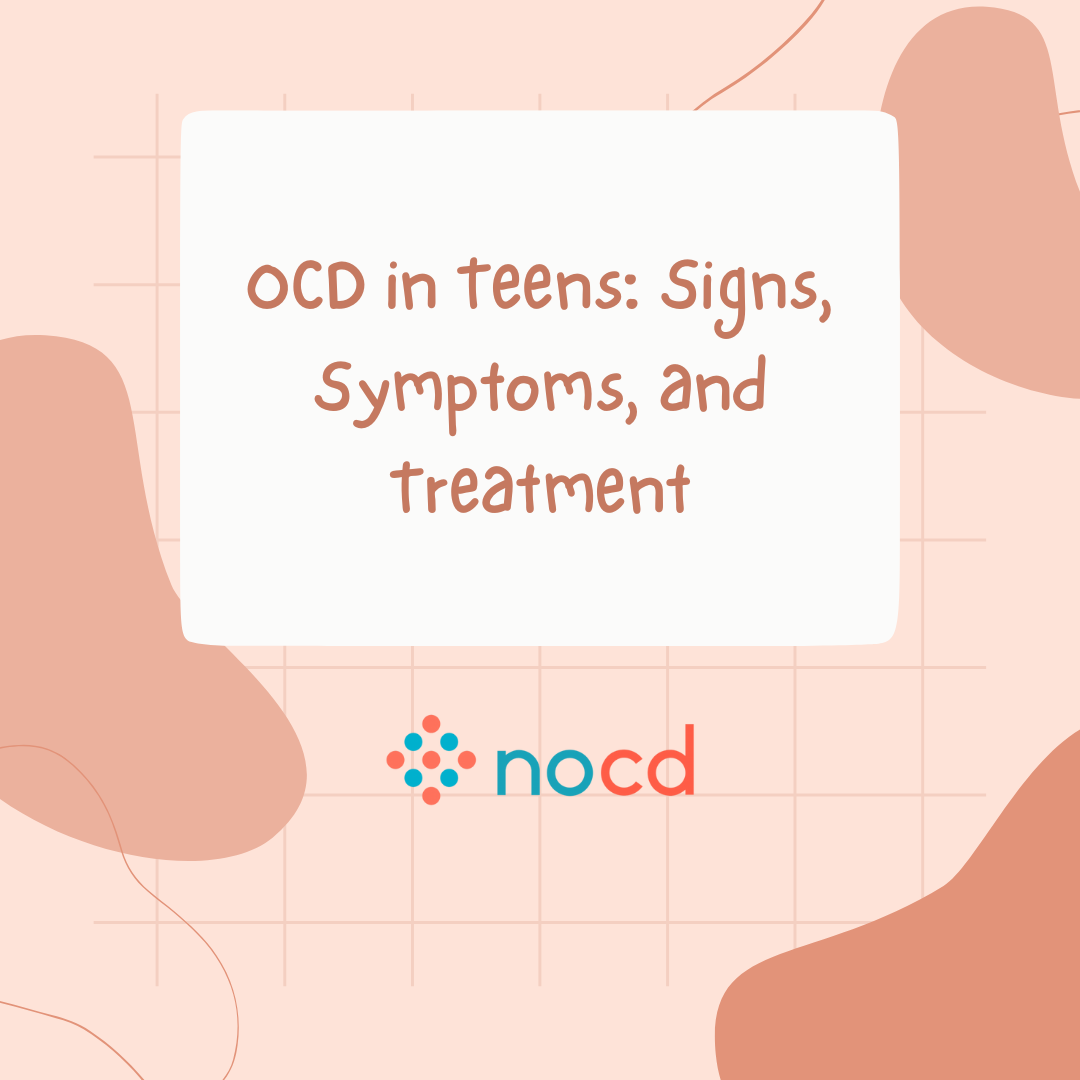
Best Options for Online Therapy for Teens With so many truly amazing online therapy options for teens, choosing one can be difficult. Some of the most important factors to consider before selecting a company are your budget, who takes your insurance, which ones can answer your questions, and most importantly, who your teen likes the best. Supporting and listening to your teen is crucial for a successful therapy experience.






